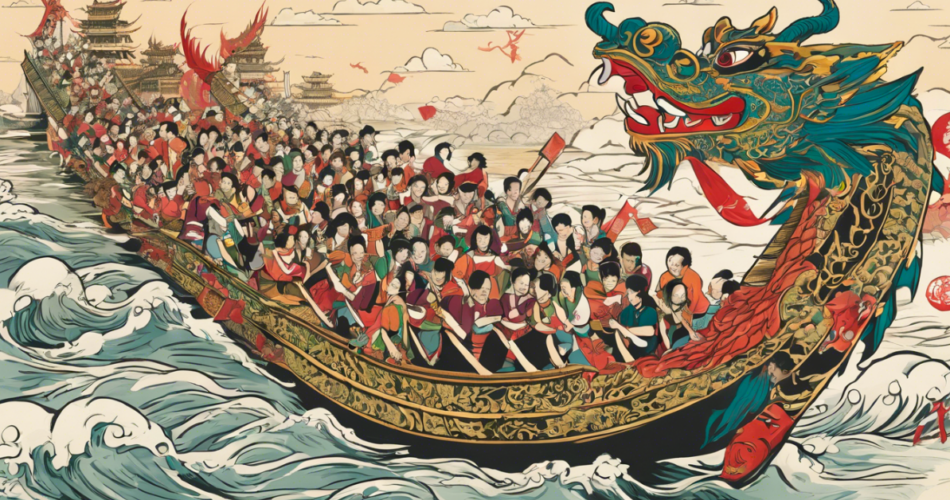The Dragon Boat Festival, with its deep historical roots and captivating traditions, stands as a vivid tapestry of culture, sportsmanship, and communal celebration. Notably recognized for its iconic dragon boats, this festival transcends geographical boundaries, resonating with people around the world. Originally rooted in ancient China, the festival now sees global acknowledgment, with events like the Denver Dragon Boat Festival highlighting its widespread appeal. It is a time when communities come together to partake in races that are as much about vigor and competition as they are about cultural homage, making the Dragon Boat Festival a multifaceted celebration of life, heritage, and unity.
This article aims to delve into the rich tapestry of the Dragon Boat Festival, beginning with its history and origins, which trace back to ancient Chinese traditions and legends. Following this, the cultural significance and the traditions surrounding the festival will be explored, offering insights into the rituals that give this celebration its soul. Moreover, the evolution of the festival into modern-day celebrations and events, including the renowned Dragon Boat Festival in Denver, will be examined to showcase how tradition blends with contemporary festivities. Through this exploration, the article will provide a comprehensive overview of the Dragon Boat Festival, illuminating its enduring legacy and the reasons behind its growing popularity.
Table of Contents
History and Origins of the Dragon Boat Festival
The Dragon Boat Festival, also known as Duanwu Jie, has a rich history that dates back over 2,000 years to the Warring States period of ancient China. This festival is deeply intertwined with the legend of Qu Yuan, a patriotic poet and advisor who tragically drowned himself in the Miluo River. His death was marked by the local populace racing dragon boats in a frantic effort to save him, giving birth to the dragon boat races. This act of homage has evolved, incorporating the tradition of throwing zongzi (sticky rice dumplings) into the river to protect his body from fish, symbolizing loyalty and remembrance.
Ancient Traditions
Traditionally, the fifth lunar month was considered perilous, filled with misfortune. To counteract this, ancient practices involved hanging herbs like calamus and Artemisia to ward off evil, and performing dragon boat races to appease the dragon spirits believed to bring rain and prevent illness.
Qu Yuan and the Legend
Qu Yuan’s legacy as a symbol of fidelity and sacrifice continues to resonate. His poetic works expressed his deep love for his state, and despite his exile, his spirit remains a central figure of the festival, embodying the values of loyalty and righteousness.
Modern Celebrations
Today, the Dragon Boat Festival is celebrated globally, blending ancient customs with modern festivities. Races now promote teamwork and community spirit, and zongzi remains a popular delicacy, symbolizing the festival’s historical roots and the enduring memory of Qu Yuan.
Cultural Significance and Traditions
The Dragon Boat Festival, deeply rooted in East Asian culture, showcases a blend of ancient customs and community spirit. Central to the festival are the dragon boat races, symbolizing the local efforts to rescue the patriotic poet Qu Yuan. These races not only reflect a historical act of valor but also emphasize teamwork and unity among participants.
Another pivotal tradition is the preparation and sharing of zongzi, sticky rice dumplings wrapped in bamboo leaves. Originally thrown into the river to protect Qu Yuan’s body, today they are a festive delicacy, symbolizing the festival’s historical roots and the community’s respect for its cultural heritage.
Realgar wine, a traditional drink, plays a dual role in the festival. Believed to repel insects and evil spirits due to its arsenic content, it is used cautiously, often marked by the ritual painting on children’s foreheads to ward off pests. This practice, while rooted in historical lore, highlights the festival’s deep connection to health and protection themes within the community.
Modern-Day Celebrations and Events
Major Festivals Around the World
Modern-day celebrations of the Dragon Boat Festival showcase vibrant cultural exchanges and competitive spirit across the globe. Notable events include the Boston Hong Kong Dragon Boat Festival, the oldest in the USA, which features new food vendors and performers each year. Similarly, the Sydney Dragon Boat Festival combines racing with a spectacular fireworks display, embracing both Chinese New Year and Australian Indigenous culture.
Highlight on Colorado and Boston Festivals
The Colorado Dragon Boat Festival, held annually at Sloan’s Lake Park, is recognized as the largest event of its kind in the US, bringing together 170,000 performers, vendors, and attendees. It offers a rich program including traditional Chinese folk arts and a bustling community atmosphere. Meanwhile, the Boston festival not only emphasizes competitive racing but also partners with local authors and celebrates significant anniversaries, enhancing community engagement and cultural appreciation.
Conclusion
Throughout this exploration, we have traversed the historical origins and cultural depths of the Dragon Boat Festival, witnessing its evolution from ancient Chinese tradition to a globally celebrated event. The festival’s rich tapestry of customs, from the symbolic dragon boat races to the communal sharing of zongzi, exemplifies a continuing legacy of unity, remembrance, and cultural vibrancy. Through such practices, the festival not only honors the patriotic spirit of Qu Yuan but also reinforces the values of teamwork and community across continents and cultures.
As the Dragon Boat Festival garners international recognition, its significance transcends mere celebration, weaving into the global fabric a stronger sense of cultural heritage and communal identity. The widespread embrace of this festival underscores the importance of preserving tradition while adapting to modern contexts, offering a beacon for cultural exchange and understanding. In this light, the Dragon Boat Festival stands as a testament to the enduring appeal of cultural festivities that bridge the past with the present, inviting future generations to partake in its rich historical legacy and values.

